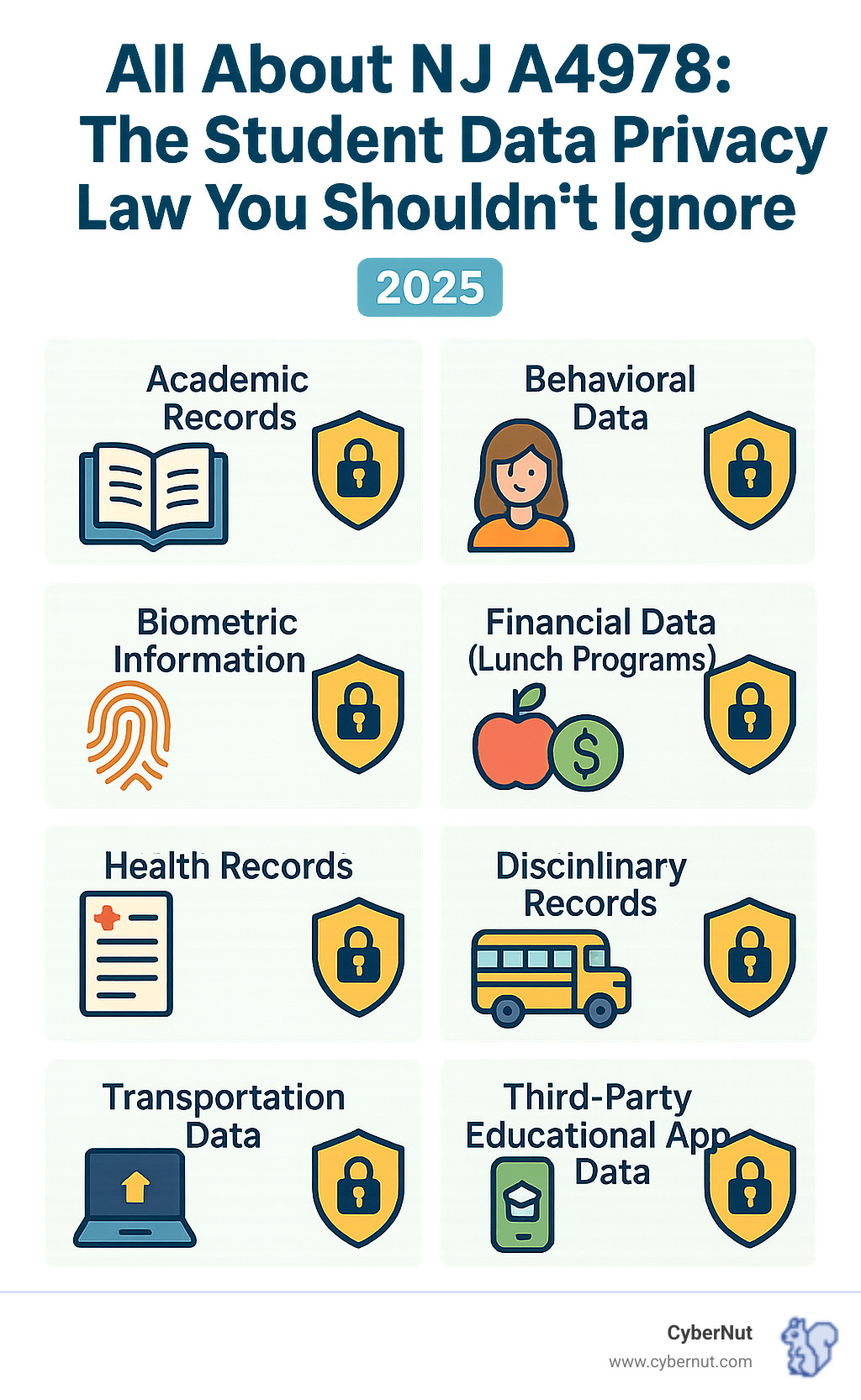
Oliver Page
Case study
August 20, 2025

All About NJ A4978: The Student Data Privacy Law You Shouldn't Ignore - here's what you need to know:
Quick Facts:
Student data is a prime target for cybercriminals, with K-12 schools facing more data breaches than any sector except healthcare. Every time a student uses school technology, they create a digital footprint that needs protection.
Recognizing this threat, New Jersey passed Senate Bill 332 (S332) in 2024. While many search for "NJ A4978," S332 is the actual law. It directly impacts how schools handle student information, from learning management systems to lunch payment apps.
The stakes are high. Non-compliance can lead to penalties of up to $10,000 per violation. More importantly, poor data protection puts students at risk of identity theft and other privacy violations that could follow them for years.

While many search for "All About NJ A4978: The Student Data Privacy Law You Shouldn't Ignore," the actual law is Senate Bill 332 (S332), officially P.L. 2023, c.266 (S332 6R). Signed into law on January 16, 2024, it takes effect on January 15, 2025.
As the 13th state to pass such a law, New Jersey's version is notable for its broader definitions and fewer exemptions than federal laws like FERPA, requiring schools and their vendors to be diligent.
The New Jersey Data Privacy Act (NJDPA) applies to data controllers (who decide how to use data) and data processors (who handle data on behalf of controllers).
The law applies to organizations doing business in New Jersey that either process data from 100,000+ NJ residents or process data from 25,000+ residents while profiting from its sale. Large districts or ed-tech companies serving multiple schools will likely meet these thresholds.
The law protects "personal data"—any information linked to a person, from names and grades to web browsing on school devices. For more on this, see our guide on Sensitive Data Definition and Types.
Understanding these terms is crucial for compliance.
This law gives New Jersey families unprecedented control over their children's digital information.

The law that passed, S332, puts real power into the hands of parents and students regarding their personal data. It ensures you have a say in how your child's digital trail—from quiz scores to lunch purchases—is used. The law also places serious obligations on schools and their tech vendors, requiring robust data security, clear breach notifications, and transparency.
Under the NJDPA, parents and eligible students gain legally enforceable rights over personal data:
You also have the right to designate an authorized agent and appeal a school's denial of your request. For more on privacy practices, visit our Privacy page.
Schools and their tech partners have new responsibilities to protect student data:
These obligations create a protective shield around student data. Schools need a comprehensive Data Security and Privacy Plan to comply. The law transforms student data privacy from a "nice to have" into a "must have," ensuring meaningful control for families.

Implementing S332 by the January 15, 2025 deadline presents challenges. Schools face problems with resource allocation, vendor management, and staff training. Data privacy is a critical piece of the larger puzzle of Cybersecurity Risks: Protecting K-12 Schools from Evolving Threats. Taking action now will make your school more secure in the long run.
Breaking compliance into manageable steps makes the process easier.
S332 adds to existing federal laws like FERPA and COPPA. While FERPA governs education records, S332 addresses the commercial use of data, targeted advertising, and grants more specific rights like data deletion. It aligns with COPPA for children under 13 but extends special protections to students aged 13-16.
Compared to other state privacy laws, New Jersey's has broader definitions and fewer exemptions, applying more widely to educational institutions. Its definition of biometric data is comprehensive, and its requirement for controllers to recognize universal opt-out mechanisms for profiling is unique. This could impact schools using AI-powered platforms that make significant decisions about students.
Essentially, S332 treats schools more like commercial entities regarding data, reflecting a national trend toward stronger privacy protections. For more on related issues, see our discussion on AI and Equity: Cybersecurity Risks in Algorithmic Bias and Access.
We know navigating All About NJ A4978: The Student Data Privacy Law You Shouldn't Ignore can be confusing. Here are answers to common questions about the new law.
The short answer is No, not without explicit consent. The NJDPA defines "sale of data" broadly to include exchanging personal information for money or "other valuable consideration," like free services.
For children aged 13-16, their own consent is required before their data can be sold or used for targeted advertising. For children under 13, parental consent is mandatory. The bottom line is that your child's personal information cannot be sold to marketing companies without your permission.
The process is designed to be straightforward.
If your request is denied, the school must explain why and provide instructions on how to appeal. You have the right to access, correct, delete, and obtain a portable copy of the data.
The New Jersey Attorney General's Division of Consumer Affairs has exclusive enforcement authority.
The goal is to create strong incentives for protecting student data, not to punish schools.
The New Jersey Data Privacy Act (S332) is more than a regulation; it's a commitment to creating a safer digital world for students. It establishes that student data is not a commodity but personal information deserving of strong protection. For parents, this means gaining real control, and for schools, it means embracing a new standard of care.
Schools and ed-tech vendors must now be proactive. This involves conducting data mapping, updating privacy policies, and ensuring vendor contracts are solid. The 45-day response time for parent requests is an opportunity to build trust, not just a legal deadline.
A key part of compliance is creating a culture of security. Cybersecurity training is essential to empower teachers, administrators, and staff to recognize threats and handle student data appropriately. This "human firewall" is a school's best defense.
At CyberNut, we've seen how our gamified micro-trainings can transform a school's security posture by making staff aware of phishing attempts and proper data handling.
The January 15, 2025 effective date is approaching. The 18-month grace period for fixing violations won't last forever, and preparing your systems takes time.
Is your school truly prepared? Start by understanding your vulnerabilities with a complimentary phishing audit. Then, build lasting protection with our training solutions designed for Cybersecurity for Educational Institutions. Protecting our students' digital future is a shared responsibility, and being proactive is essential.

Oliver Page

Some more Insigths


Back